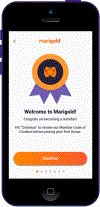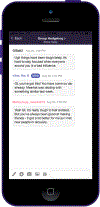Mobile Peer-Support for Opioid Use Disorders: Refinement of an Innovative Machine Learning Tool
- PMID: 32149192
- PMCID: PMC7059630
- DOI: 10.20900/jpbs.20200001
Mobile Peer-Support for Opioid Use Disorders: Refinement of an Innovative Machine Learning Tool
Abstract
Background: The majority of individuals with Opioid Use Disorder (OUD) do not receive any formal substance use treatment. Due to limited engagement and access to traditional treatment, there is increasing evidence that patients with OUDs turn to online social platforms to access peer support and obtain health-related information about addiction and recovery. Interacting with peers before and during recovery is a key component of many evidence-based addiction recovery programs, and may improve self-efficacy and treatment engagement as well as reduce relapse. Commonly-used online social platforms are limited in utility and scalability as an adjunct to addiction treatment; lack effective content moderation (e.g., misinformed advice, maliciousness or "trolling"); and lack common security and ethical safeguards inherent to clinical care.
Methods: This present study will develop a novel, artificial-intelligence (AI) enabled, mobile treatment delivery method that fulfills the need for a robust, secure, technology-based peer support platform to support patients with OUD. Forty adults receiving outpatient buprenorphine treatment for OUD will be asked to pilot a smartphone-based mobile peer support application, the "Marigold App", for a duration of six weeks. The program will use (1) a prospective cohort study to obtain text message content and feasibility metrics, and (2) qualitative interviews to evaluate usability and acceptability of the mobile platform.
Anticipated findings and future directions: The Marigold mobile platform will allow patients to access a tailored chat support group 24/7 as a complement to different forms of clinical OUD treatment. Marigold can keep groups safe and constructive by augmenting chats with AI tools capable of understanding the emotional sentiment in messages, automatically "flagging" critical or clinically relevant content. This project will demonstrate the robustness of these AI tools by adapting them to catch OUD-specific "flags" in peer messages while also examining the adoptability of the platform itself within OUD patients.
Keywords: application; machine-learning; mobile treatment; natural language processing; opioid use disorder; peer support; technology.
Figures
Similar articles
-
A Mobile Health App to Support Patients Receiving Medication-Assisted Treatment for Opioid Use Disorder: Development and Feasibility Study.JMIR Form Res. 2021 Feb 23;5(2):e24561. doi: 10.2196/24561. JMIR Form Res. 2021. PMID: 33620324 Free PMC article.
-
Text Messages Exchanged Between Individuals With Opioid Use Disorder and Their mHealth e-Coaches: Content Analysis Study.JMIR Hum Factors. 2023 Mar 10;10:e37351. doi: 10.2196/37351. JMIR Hum Factors. 2023. PMID: 36897632 Free PMC article.
-
Using Machine Learning of Online Expression to Explain Recovery Trajectories: Content Analytic Approach to Studying a Substance Use Disorder Forum.J Med Internet Res. 2023 Aug 22;25:e45589. doi: 10.2196/45589. J Med Internet Res. 2023. PMID: 37606984 Free PMC article.
-
Artificial intelligence interventions focused on opioid use disorders: A review of the gray literature.Am J Drug Alcohol Abuse. 2021 Jan 2;47(1):26-42. doi: 10.1080/00952990.2020.1817466. Epub 2020 Oct 2. Am J Drug Alcohol Abuse. 2021. PMID: 33006905 Review.
-
Developing an opioid use disorder treatment cascade: A review of quality measures.J Subst Abuse Treat. 2018 Aug;91:57-68. doi: 10.1016/j.jsat.2018.06.001. Epub 2018 Jun 2. J Subst Abuse Treat. 2018. PMID: 29910015 Free PMC article. Review.
Cited by
-
Self-Reported Advantages and Disadvantages of Online Networking About Opioid Misuse Among Those Who Have or Are Currently Misusing Opioids.Subst Use Misuse. 2025;60(9):1286-1297. doi: 10.1080/10826084.2025.2495778. Epub 2025 May 6. Subst Use Misuse. 2025. PMID: 40329573
-
A pilot study of a mixed-method approach to design an ED-based peer mHealth referral tool for HIV/HCV and opioid overdose prevention services.Drug Alcohol Depend. 2022 Sep 1;238:109585. doi: 10.1016/j.drugalcdep.2022.109585. Epub 2022 Jul 23. Drug Alcohol Depend. 2022. PMID: 35926299 Free PMC article.
References
-
- Overdose Death Rates. 2017. Available from: https://www.drugabuse.gov/related-topics/trends-statistics/overdose-deat... Accessed 2017 Jan 7.
-
- Rudd RA, Aleshire N, Zibbell JE, Gladden RM. Increases in Drug and Opioid Overdose Deaths--United States, 2000–2014. Morb Mortal Wkly Rep. 2016;64:1378–82. - PubMed
-
- IMS Institute for Healthcare Informatics. Medicines Use and Spending in the U.S.A Review of 2015 and Outlook to 2020. City (Country): IMS Institute for Healthcare Informatics; April 2016. Available from: http://www.imshealth.com/en/thought-leadership/quintilesims-institute/re... Accessed 2016 Dec 6.
Grants and funding
LinkOut - more resources
Full Text Sources
Medical



